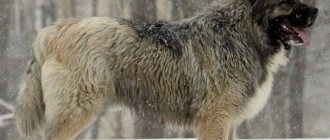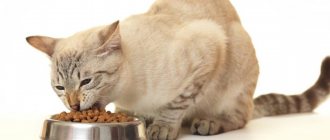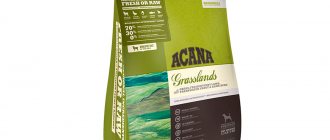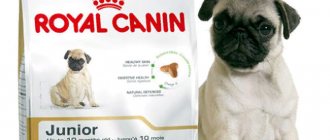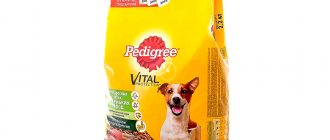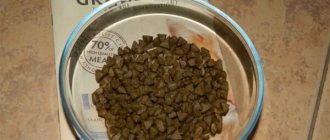What and how to feed the Caucasian Shepherd falls entirely on the shoulders of the owner; it is quite difficult for unprepared people to resolve this issue. Let's figure out what is necessary for proper nutrition of a dog and how to calculate the necessary needs correctly.
The Caucasian is a large dog that needs good and precisely balanced nutrition that meets all requirements. There are different ways to provide a friend with good feeding. The quality of food determines how much the puppy will develop and how the condition will be maintained in adulthood.
This attitude is necessary, because the quality of life depends on proper care of your pet.
What to feed a Caucasian Shepherd puppy and an adult
Feeding for the Caucasian Shepherd can be of two types:
- Natural – self-cooking from natural products;
- Feeding with prepared foods - dry food, canned food, natural food with industrial processing.
Ready-made feed
Each of these methods has its own advantages and disadvantages. Both options are acceptable, but as practice shows, the simplest of them is ready-made food. They are already calculated, balanced and do not require preparation. Calculating the amount is very simple - just know the weight and age of the dog; manufacturers indicate on the packaging how many grams per day the pet should receive.
In addition, you will not need to buy vitamins, mineral supplements or give bone meal. All this is already provided for in it. Storage without any special features, if you calculate the cost of natural food and a bag of feed, it turns out to be a more than useful benefit.
- You need to choose food based on the age, physical activity and breed characteristics of the animal. Manufacturers produce lines that fully take into account these conditions, which allows you to quickly and easily select food.
The advantage of choosing is on the side of proven brands that meet all the parameters:
- Go natural;
- Purina PRO plane;
- Almo Nature;
- Orijen;
- Brit Premium.
Food is selected separately for babies, nursing and pregnant bitches, adult dogs and elderly animals. Puppies require more high-calorie nutrition, older dogs less, and adults need a higher content of protein and vitamins.
Much depends on the breed and physical activity levels; it is also worth remembering that each animal is individual. Often a person may encounter allergic reactions in a pet to one or another element, in which case a change in diet occurs.
It is important to maintain a drinking regime; the dog must have access to water.
When switching to a new diet, it will take time; the addition will be gradual, in small amounts until a complete change occurs. You should not mix two types of food: natural food and dry food.
Natural nutrition
Natural food is quite difficult to prepare and requires certain knowledge. Product calculations must be accurate. The Caucasian is a large dog, he will need a fairly large amount of protein, vegetables/fruits and porridge.
The meals are prepared according to the following principle: 30% of the total is protein, 20 is vegetables/fruits/greens and 10 is porridge.
The puppy has a precise regimen, a limited amount of food that is calculated in advance, and a feeding schedule. Up to 2 months, the baby will receive a special menu, approximately the same as a nursing bitch.
All products are introduced gradually, each of them has its own processing and preparation features.
Important. In addition to this method, the following are selected: vitamins and mineral supplements, additional calcium supplements, vegetable fats.
How to feed a Caucasian Shepherd puppy
What to feed a Caucasian Shepherd puppy at 3 months so that it grows into a healthy, well-formed dog? To do this, it is necessary to pay special attention to the presence of animal proteins in the diet. They are found in large quantities in meat or dairy foods.
It is enough for an adult, mature dog to eat up to 30% of the bulk of the food. For puppies this figure is 50%. Some tips from dog handlers:
- The Caucasian Shepherd is one of the largest dog breeds. In order for her to be full of health and energy, she needs a balanced diet;
- 3 month old puppies are fed at the same time. The number of feedings is four. Frequent feeding allows the puppy's stomach to gradually get used to “adult” food. It is very important not to overfeed the puppy. Large amounts of food often lead to improper development of the animal’s skeleton, arching of the back, and deformation of the limbs;
- Decide in early childhood how your dog will eat. Will it be natural feeding, or will he eat ready-made food? It is necessary to choose food only from proven, well-known brands. The food class should be only the highest and intended specifically for puppies of large breeds of dogs;
- A dog's intestines cannot digest plant foods for a long time. It is easier for him to cope with meat food. Since you have decided to get a dog of such a huge breed, you need to understand that meat should be the basis of your dog’s diet. The puppy should receive everything he needs
- carbohydrates;
- fats;
- vitamins;
- amino acids;
- proteins;
- fiber;
- minerals.
- Porridge made with chicken broth with the addition of pieces of boiled chicken will be beneficial for a three-month-old puppy. However, we must remember that for any dog, raw meat that is pre-frozen will be healthier;
Pay attention to your dog, love him and be sure to educate him. And his concern is to love you unconditionally and protect you.
Currently reading:
- Games to choose for training a dog
- How to create the right diet for Shar Pei
- Choosing the right food for your miniature pinscher
- Is it worth it or not to include natural food in your dog’s diet?
In the first 12 months
Nutrition for the Caucasian Shepherd is extremely important during this period. The body develops and actively grows, the lack of some elements or its excess can lead to irreversible consequences.
While the puppy is growing, you will need to carefully monitor the quantity and quality of the menu. He needs:
- At 1.5 – 2 months – 230 – 250 grams of protein;
- 3 – 5 months 260 – 410 grams;
- 5 – 7 months: 420 – 550;
- 8 – 12 months – 510 – 900 grams.
Protein comes not only from meat and offal; you will also need dairy products, especially at the initial stage of development.
Meat and other products
Typically, preference is given to lean meat with minimal fat content:
- Chicken. Skinless, boneless, raw. It is worth remembering that not everyone can tolerate chicken; you may be allergic to it; if you notice signs of an allergic reaction or digestive upset, replace it.
- Beef. Only lean, first freshness, cleaned of veins and bones, chopped into small pieces, without heat treatment.
- Turkey. Boneless, skinless, finely chopped.
- Veal. Without veins and seeds.
As an addition in older age, chicken necks, large cartilage - give as goodies, chew. In specialized stores, you can buy “stringy bones” that are great for gnawing.
- Fish. Only sea fish, always cleaned of bones, without heads and entrails. Give 2 - 3 times a week, contains a lot of protein and phosphorus. You can't give river water.
- Offal. You can diversify your diet with the help of offal; it is important to rinse and boil as thoroughly as possible, without salt or other spices.
It can be:
- Liver;
- Kidneys;
- Heart;
- Neck;
- Offal (stomach);
- Lung.
- Milk: a must in the diet, with minimal fat content. From liquid - kefir, fermented baked milk, yoghurts without additives and sugar, grain cottage cheese. Cheese with only a minimum percentage of fat content.
- Cereals and porridges: cooked in water or broth. Without salt and spices. Buckwheat and rice are the most popular. It’s better not to cook oatmeal, but just brew it. Exclude legumes and millet.
- Vegetables and fruits: raw, finely chopped, chopped or grated. Zucchini, eggplant, pumpkin, cucumbers, carrots, tomatoes (not in large quantities), cauliflower, broccoli, white cabbage, bell peppers. Omit potatoes. Melon and watermelon.
- Fruits: apples, pears, bananas, seasonal berries. Exclude grapes and plums, as well as citrus fruits.
- Greens: parsley, dill, leafy green lettuce, celery.
- Eggs: given raw, no more than 2 times a week, be sure to check the freshness.
At two months
At 2 months old, a Caucasian puppy can already be fed with many additional foods, as well as given into new hands. By this time, they try cottage cheese, porridge, many vegetables and even meat.
- Or by this time they completely switch to food, while many of them may still receive mother’s milk. If a child moves to a new home, he continues to receive the same benefits as from the breeder.
In a new home, he gradually gets accustomed to new food; it is introduced gradually and in small portions. Feeding 4 - 5 times a day, in small portions with an interval of 4 hours.
Puppy feeding schedule
Approximate feeding schedule for a baby:
- From 2 months: 5-6 times a day, with a 4-hour break between them.
- 3-4 months: 4-5 times a day, break 5 hours.
- 5 – 7 months: 3 -4 times;
- 7 -12 months: 3 – 2 times.
- From 12 months: the pet switches to 2 doses a day.
Feeding:
- In the morning: porridge with meat/vegetables/greens;
- For lunch: cottage cheese;
- Afternoon snack: kefir;
- Dinner: porridge with meat/greens/fruits;
- Late dinner: vegetables/porridge.
Supplements and vitamins for shepherds
The baby is on a natural diet, receives a complex of vitamins and calcium supplements - for growth and development. In this case, the most optimal option is selected that will complement the menu.
The conditions for taking each vitamin or calcium supplement are different; before purchasing, consult with a specialist at the veterinary store and your doctor.
Adults can receive supplements - in winter, lactating and pregnant bitches receive special courses of multivitamins.
Feeding
Natural food is more risky for maintaining a balance between starvation and excess weight of the puppy, so ready-made food is preferable.
Veterinarians recommend food for large dogs of premium class and higher. Take the Attention Test! Find 10 differences! (click right here!)
Find the answer Are you bothered by some problem or question? Enter “Breed” or “Name of the problem” into the form, press Enter and you will find out everything about the issue that interests you.
These mixtures contain from 30% to 55% protein, essential vitamins.
Its sources are chicken, turkey, offal, and lamb. Contains eggs, vegetables, fish oil. To support healthy bone and joint formation, shellfish and sea cucumber extracts containing glucosamine and chondroitin are added.
Elderly Caucasians are given special food for older pets, where the protein content is reduced to 15-20%. Plant components - flax seeds, brewer's yeast, psyllium fiber - strengthen the immune system, improve the functioning of the digestive system and the condition of the coat.
Nutrition of the Caucasian Shepherd after a year
It is better to feed an adult dog at home 2 times a day after walking. The diet consists of the proposed, permitted products. The calculation is based on the following indicators:
- Pet's weight;
- His physical activity is residual (walking/active games);
- Age.
Based on weight, you will need to calculate: 30 grams of protein (meat/offal/fish) per 1 kg of animal. Porridge accounts for 10% and 20% for vegetables/fruits/greens.
Approximate daily diet:
- Buckwheat porridge with tripe, grated medium carrot, zucchini, raw egg.
- Rice porridge/sea fish with broccoli and tomato, dill and parsley.
- During the day: apple and pear.
Feed calculations are indicated on the packages; a measuring cup is usually included. Feeding with dry food is much simpler and more profitable in terms of price and quality.
Feeding the Caucasian Shepherd with ready-made food
Modern owners of dogs, both small and large, as well as breeders, most often choose this type of feeding based on its advantages:
- you won’t have to waste time on cooking;
- the daily allowance can be easily calculated taking into account the weight of the pet and the data indicated on the packaging;
- the manufacturer has already calculated the balance of various important ingredients;
- the product contains all the necessary elements, and no additional fertilizing is required;
- Ready-made products are convenient to store; you can purchase them in reserve by choosing a package of suitable weight.
Undoubtedly, industrial diets have a number of advantages, but feeding “Caucasians” with such food requires care. First of all, you should take into account a number of nuances, which we will dwell on in more detail.
The product must be of high quality
Cheap food that can be found on the shelves of any supermarket does not meet the requirements set by veterinarians and breeders. And even if your pet eats them with great appetite, do not delude yourself - dogs, like people, are attracted to flavoring additives that are harmful to the body.
Economy class food consists of low-quality products - meat waste, corn, wheat. In addition, manufacturers of such food do not skimp on chemical ingredients. After eating such granules, the shepherd's gastrointestinal tract is disrupted, his general health worsens, and naturally, his appearance also suffers.
A caring owner is recommended to pay attention to high-quality diets belonging to the premium and super-premium classes. The main components of these foods are meat, fish, and offal, that is, sources of animal protein necessary for the full functioning of the body of predators, which, in fact, are all dogs.
In addition, the diet contains the required amount of carbohydrates, fats, and fiber. The food is perfectly balanced and well digestible.
The food must be suitable for representatives of this particular breed
When choosing, it is important to consider the pet’s size, age and health characteristics. “Caucasians” are suited to a menu for large breeds, and even better – giant ones. It usually consists of large granules and meets the needs of such an impressive pet. It is not recommended to feed an adult dog a puppy diet, and vice versa.
If the owner does not have the opportunity to prepare meals for his four-legged friend every day, and he, in turn, turns his nose up at industrial products, you can try changing the brand. And when this technique does not give a positive result, you will still have to switch to another type of feeding.
If you feed the dog food that is not suitable for him, the owner risks the health of his four-legged friend, especially since Caucasian Shepherd dogs often exhibit allergic reactions.
Prohibited Products
Food without salt and spices. Human food in the form of soup, cabbage soup, canned food and semi-finished products should be completely excluded. It is prohibited to give in any quantity:
- Pasta;
- Potato;
- Tubular bones;
- Chocolate, sugar and other sweets;
- Butter pastries;
- Sausage, frankfurters, smoked meat;
- Salo;
- Mushrooms;
- Dried fish;
- Refrain from table scraps.
The owner chooses the Caucasian Shepherd and what to feed it. It is best to consult a doctor or breeder in advance. Usually, before the new owner takes the baby into the house, breeders recommend food and talk about all the features of the diet.
Share link:



